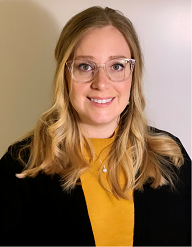
Deciding to quit smoking is one of the best things you can do for your health, but the prospect of dealing with nicotine withdrawal and other effects can be daunting. Emilie Serano, an advanced practice nurse in smoking cessation at the University of Ottawa Heart Institute provides practical, evidence-based answers to some of the most frequently asked questions about quitting smoking.

Remember, The Ottawa Hospital has several smoking cessation programs for both patients and people in the community to support you.
What makes nicotine so addictive?
Nicotine is so addictive in tobacco because of how fast it hits your brain and how powerful that hit is.
As soon as nicotine is absorbed in your lungs, your brain releases neurotransmitters (chemical messengers) such as dopamine into your brain within about ten seconds.
Do nicotine replacement products work?
Nicotine replacement products like gums, lozenges, inhalers, patches and sprays can be effective tools to help people stop smoking, but they do not act instantly, as nicotine does.
| Product | Time to take effect |
| Gum | 2 to 5 minutes |
| Lozenge | 2 to 5 minutes |
| Inhaler | 2 to 5 minutes |
| Patch | 1 to 2 hours |
| Spray | 1 minute |
Talk to your smoking cessation counsellor about what nicotine replacement product might be right for you.
Aren’t nicotine patches harmful?
No. Nicotine is the addictive ingredient in a cigarette, but it does not cause cancer, lung damage or heart disease. The harm from smoking comes from the thousands of chemicals contained in cigarette smoke.
Can I get addicted to nicotine replacement products?
A lot of people shy away from nicotine gums, inhalers, patches and sprays out of fear that they are themselves addictive. These products are absorbed through the mouth or skin—not the lungs, meaning that the absorption is much slower. So your risk of addiction is much lower.
I’m sick in the hospital. Does it really matter if I quit now?
Definitely. Whether you’ve been smoking your whole adult life, or have just been diagnosed with cancer, it is worth quitting because you can start to see improvements in your health within eight hours of your last cigarette.
Quitting smoking can:
- Prevent you from having to be readmitted to the hospital.
- Prevent infections.
- Prevent you from having to use an oxygen tank.
There are no guarantees, but by quitting smoking, you are stopping any damage that continuing to smoke could cause. It doesn’t matter how old you are or what condition your health is in. It’s never too late to quit.
What happens when I quit smoking?
Good thigs happen in eight hours after your last cigarette, and continue to benefit you years into the future.

What are the symptoms of nicotine withdrawal?
Nicotine is a powerfully addictive chemical, so your body will most likely feel uncomfortable when it does not get as much nicotine as it’s used to. Here are some symptoms of nicotine withdrawal:
- Feeling restless
- Feeling irritable or grouchy
- Feeling anxious
- Feeling depressed
- Having trouble concentrating
- Having trouble sleeping
Medication or natural supplements such as nicotine replacement products will help lessen the withdrawal symptoms, which will make you more comfortable and make it easier to reduce or quit.
I’ve tried quitting before and failed. Why should I try again?
Try to reframe the way you think about your “failures.” They’re more like trial runs. The more times you try to quit smoking, the more likely you are to quit for good. Every time you try, you learn something new about yourself, and you bring that knowledge forward to your next attempt. It’s like adding a new piece to a puzzle. Eventually all the pieces will be in place.
Do I have to quit cold turkey?
No. Setting a quit date can be a big barrier for a lot of people. Many people rebel against this idea and think to themselves, ‘Well, I can’t see myself quitting in the next year, so I’m not even going to try.’ Or ‘I don’t want to fail again.’ The more pressure on a particular date, the more stress you’ll feel and the more likely you’ll be to reach for a cigarette to manage that stress.
A more gradual approach is often more realistic. If you feel a craving, try the four “D”s:
- Delay: Try to wait 15 to 30 minutes.
- Distract: Do something you enjoy to keep your mind off smoking.
- Drink water: A glass of water can offer a healthy distraction and can help you feel satisfied.
- Deep breathing: This can help reduce your stress.
Over time, your brain will no longer associate certain patterns with smoking, helping you quit for good.
Why else should I quit smoking?
In addition to improving your health, there are many other benefits to quitting smoking. For example:
- You’ll save money on cigarettes and tobacco products.
- Your life and house insurance premiums may go down.
- Smoking cigarettes will no longer control your life.
- You won’t have to search for places that will let you smoke.
- You’ll feel proud of yourself for overcoming something so challenging.
How can I support my loved one who wants to quit smoking?
The Smokers’ Helpline is a really good resource for family and friends who want to support their loved one on their smoking cessation journey.
I’ve seen well-meaning people try to micromanage their spouse’s smoking. They have the best intentions, but resentment and stress levels may rise, which could result in a smoker turning to cigarettes to relieve the stress.
It’s important that people come up with a plan together so that there’s a balance: there’s enough motivation to keep the person going on their journey to quit, but not enough pressure or stress to make them want to give up.
If you’re not sure how to help, ask them what kind of support they need.
It’s never too late to quit, and you aren’t alone.
Contact a quit smoking program through The Ottawa Hospital or the Quit Smoking Program at the University of Ottawa Heart Institute for support.

Support patient care and research at
The Ottawa Hospital
You might also like…
Aging well: Guidance for older adults
In this special video series for both older adults and their loved ones, geriatric care specialists from The Ottawa Hospital offer guidance on navigating common health-care challenges that may arise with aging.
How to stay safe around water this summer
Drowning can happen to anyone — even strong swimmers. Emergency physician Dr. Christian Vaillancourt debunks common myths about drowning, explains how to act quickly to save a life, and shares what you can do to keep yourself and your loved ones safe around water.
What’s the difference between an optician, optometrist, orthoptist and ophthalmologist?
“Do I need to see an optician, optometrist, orthoptist or ophthalmologist?” We asked Ophthalmologist Dr. Annick Fournier to break down each role so you will know who to consult for your specific eye care needs.
Understanding rabies: Risks, vaccination and what to do after a bite
Although rare in Canada, rabies is almost always fatal once symptoms appear. Infectious diseases expert Dr. Michaeline McGuinty shares how rabies is spread, when to get vaccinated and what to do after a bite.
“My story doesn’t have to be your story”: New screening test better at preventing cervical cancer
“I went from being a 32-year-old new mom to a cancer patient with an incurable diagnosis.” Alicia’s journey underscores the critical role of HPV testing in preventing cervical cancer. Discover how the new HPV test can save lives and find out how to book your cervical screening appointment with our “Superscreener.”
Sign language interpretation services at The Ottawa Hospital: 5 FAQs
Do you require a sign language interpreter when you come to The Ottawa Hospital? For patients who are Deaf or hard of hearing, we provide both American Sign Language (ASL) and Langue des Signes Québécoise (LSQ) interpretation services at no cost. Before your next appointment with us, find out everything you need to know.


 To reset, hold the Ctrl key, then press 0.
To reset, hold the Ctrl key, then press 0.





